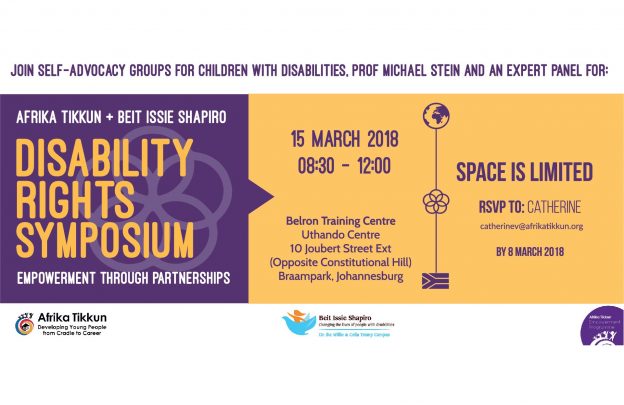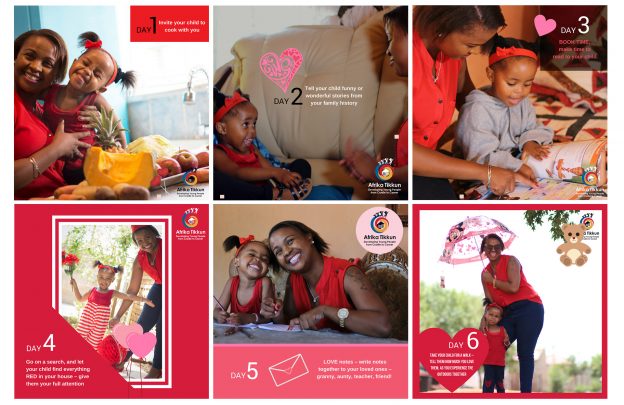“One day I would love to live in a non-ableist world where I’m not treated as dis-human and where my disabled body does not cause people to squirm and feel uncomfortable. Where I do not become the object of people’s piercing glares any time I move or go anywhere. Where people don’t feel afraid to talk to me or just ignore me through fear of causing offence (I’m seriously not made of glass!). Trust me, although I have a body, which does not match so called societal norms, it does not mean that I’m unhappy. It also doesn’t mean that because I don’t see my body being ‘healed’ in this life time that I have given up on life. I am also human and have feelings and goals too!!
The words of Dr Paul Chappell, Wits-based activist for the rights of persons with disability. It reflects but one aspect of the experience of differently abled people in South African society. Disability should not be understood as referring to a person’s difference or impairment. Disability rather refers to the life experience of that person, living in a society that is organised in a way that restricts their life choices and opportunities.
The most effective way to ensure society becomes better at supporting the life of individuals of all varieties of ability is for those who are themselves differently abled to become civically empowered. And such power is meaningful only when it has collective agency.
In early 2017, Afrika Tikkun Empowerment Programme and Beit Issie Shapiro started to collaborate with a view to organising advocacy on the rights of persons with disability at a national level. The second annual Disability Rights Symposium South Africa taking place on the 15th of March 2018 is the flagship event in the yearly calendar for organising representation of the rights of persons with disability.
In the first year the Symposium was convened, activists and parents of children with disability from around the country congregated to initiate the kind of partnership that can make effective representation to state-level duty bearers. In 2018, the Symposium will continue the work it began in sharing the advocacy work engaged in over the past year; it will generate dialogue about empowerment methodologies and showcase the usefulness of transformative collaboration and partnerships between children with disabilities and their families and those with influence – including actors in multiple state departments, as well as the disability sector and the social justice sector.
The Symposium will bring together disability rights advocates, with a panel of human rights experts, led by Prof Michael Stein. Prof Michael Stein works with disabled peoples organisations around the world, actively consults with governments on their disability laws and policies, advises a number of UN bodies and national human rights institutions, and has participated in landmark litigation.
The theme for the 2018 Symposium is influenced by Global partnerships, as described in Sustainable Development Goal 17. Accordingly the symposium will be focussing on the topic – Empowerment through Partnerships: Working together towards the effective implementation of the Convention on the Rights of Persons with Disabilities in South Africa.
/END
A LITTLE BACKGROUND
During Apartheid, the South African disability sector, although diverse, mobilised effectively, participated politically and had a powerful voice. Over the past two decades however, much of the vibrancy and dynamism of the sector has faded. As a result, effective implementation of policy and legislation that should result in the enjoyment of Constitutional rights by persons with disability have yet to be realised. In this landscape, a new generation of agents are emerging: powerful community-based self-help groups. In Gauteng, four Community-based Rehabilitation self-help groups based in township or inner city communities have demonstrated that coming together, partnering with State and non-State actors and persistently motivating for change is an effective strategy in the pursuit of human rights for all.
ABOUT PROFESSOR MICHAEL STEIN
Michael holds a J.D. from Harvard Law School and a Ph.D. from Cambridge University. Co-founder and Executive Director of the Harvard Law School Project on Disability and a Visiting Professor at Harvard Law School for over a decade, Stein holds an Extraordinary Professorship at the University of Pretoria’s Centre for Human Rights, and a visiting professorship at the Free University of Amsterdam. Stein previously was Professor (and Cabell Professor) at William & Mary Law School, and also taught at New York University and Stanford law schools. His path-breaking scholarship has been published globally by leading journals and presses, and he is the recipient of fellowships and awards from the American Council of Learned Societies, the National Endowment for the Humanities, and the National Institute on Disability Rehabilitation and Research, among others. An internationally recognised expert on disability law and policy, Stein participated in the drafting of the UN Convention on the Rights of Persons with Disabilities, works with disabled peoples organisations around the world, actively consults with governments on their disability laws and policies, advises a number of UN bodies and national human rights institutions, and has brought landmark litigation. Stein has received numerous awards for his work, including the inaugural Morton E. Ruderman Prize for Inclusion, the inaugural Henry Viscardi Achievement Award, and the ABA Paul G. Hearne Award, and was appointed by President Obama to the United States Holocaust Memorial Council.
The Harvard Law School Project on Disability (HPOD) works to promote the human rights of people with disabilities worldwide. HPOD empowers all people to use the United Nations Convention on the Rights of Persons with Disabilities (CRPD) to develop fully equitable societies. HPOD supports the development of disability civil society, informs innovative legislative and policy development, provides legal advice and human rights training to persons with disabilities, their representative organisations, non-governmental organisations, National Human Rights Institutions, and governments. We enable inclusive development practices. As a global disability law and policy center, HPOD undertakes and encourages teaching and ground-breaking scholarship on disability rights.
ABOUT AFRIKA TIKKUN
The vision of the Afrika Tikkun’s Empowerment Programme is for young people and their families to actively pursue their human rights. We do this using an empowerment approach which facilitates children, youth and their families to work together as agents for change within their homes, community and country.
One of the objectives of the Empowerment Programme is to develop and share good practice in using empowerment approaches for the provision of safe, non-discriminatory and inclusive development programmes for young people and their families. This is done by conducting robust evaluation of Programme outcomes, undertaking transformative research and disseminating information by publishing journal articles, participating in conferences and hosting dialogues and symposia.
ABOUT BEIT ISSUE SHAPIRO
In order to learn from an organisation that has been engaged in inclusive development at an international level for over 20 years, Afrika Tikkun has teamed up with Beit Issie Shapiro- Israel’s most effective non-profit organisation with ‘Special Consultative Status’ to the United Nations Economic and Social Council (ECOSOC).
Beit Issie Shapiro’s vision is of an inclusive society, which assures the rights and opportunities for maximum growth and development of children and adults with diverse abilities. Beit Issie Shapiro plays a leading role in promoting the inclusion of people with disabilities in society.

